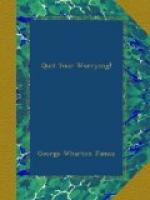FOREWORD
I the curse of
worry
II ours is the age of worry
III nervous prostration and worry
IV holy writ, the Sages and worry
V the needlessness and uselessness
of worry
VI the selfishness of worry
VII causes of worry
VIII protean forms of worry
IX health worries
X the worries of parents
XI marital worries
XII the worry of the squirrel cage
XIII religious worries and worriers
XIV ambition and worry
XV envy and worry
XVI discontent and worry
XVII cowardice and worry
XVIII worry about manners and speech
XIX the worries of jealousy
XX the worries of suspicion
XXI the worries of impatience
XXII the worries of anticipation
XXIII how our worry affects others
XXIV worry versus indifference
XXV worries and hobbies
JUST BE GLAD
BY JAMES WHITCOMB RILEY
O heart of mine, we shouldn’t
worry so,
What we have missed of calm we couldn’t
have, you know!
What we’ve met of stormy pain,
And of sorrow’s driving rain,
We can better meet again,
If
it blow.
We have erred in that dark hour, we
have known,
When the tear fell with the shower, all
alone.
Were not shine and shower blent
As the gracious Master meant?
Let us temper our content
With
His own.
For we know not every morrow
Can
be sad;
So forgetting all the sorrow
We
have had,
Let us fold away our fears,
And put by our foolish tears,
And through all the coming years,
Just
be glad.
FOREWORD
Between twenty and thirty years ago, I became involved in a series of occurrences and conditions of so painful and distressing a character that for over six months I was unable to sleep more than one or two hours out of the twenty-four. In common parlance I was “worrying myself to death,” when, mercifully, a total collapse of mind and body came. My physicians used the polite euphemism of “cerebral congestion” to describe my state which, in reality, was one of temporary insanity, and it seemed almost hopeless that I should ever recover my health and poise. For several months I hovered between life and death, and my brain between reason and unreason.
In due time, however, both health and mental poise came back in reasonable measure, and I asked myself what would be the result if I returned to the condition of worry that culminated in the disaster. This question and my endeavors at its solution led to the gaining of a degree of philosophy which materially changed my attitude toward life. Though some of the chief causes of my past worry were removed there were still enough adverse and untoward circumstances surrounding me to give me cause for worry, if I allowed myself to yield to it, so I concluded that my mind must positively and absolutely be prohibited from dwelling upon those things that seemed justification for worry. And I determined to set before me the ideal of a life without worry.




